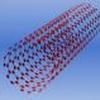IBM has just reached a new pretty significant milestone. They have created a new computer chip based on carbon nanotube technology that has more than 10,000 transistors. This is a far cry from the current generation of silicone-based microprocessors, but it does demonstrate a lot of potential for carbon nanotubes moving forward. As you might remember, carbon nanotubes are constructed with sheets of cabon that are just a single atom thick, rolling them into a cylinder.
These conduct electricity better than silicon and have the perfect shape to act as transistors. Unfortunately, they have to be completely free of inpurities and they have to be aligned perfectly. They're harder to work with, but they could hold the future of computing because carbon nanotubes can also scale much smaller than silicone. It's unlikely that we'll have a Nexus 2013 next year based on carbon nanotube technology, but with the continuing research and innovation at places like IBM, the future of Moore's Law might still be viable.
As you might remember, carbon nanotubes are constructed with sheets of cabon that are just a single atom thick, rolling them into a cylinder. These conduct electricity better than silicon and have the perfect shape to act as transistors. Unfortunately, they have to be completely free of inpurities and they have to be aligned perfectly. They’re harder to work with, but they could hold the future of computing because carbon nanotubes can also scale much smaller than silicone. It’s unlikely that we’ll have a Nexus 2013 next year based on carbon nanotube technology, but with the continuing research and innovation at places like IBM, the future of Moore’s Law might still be viable.

